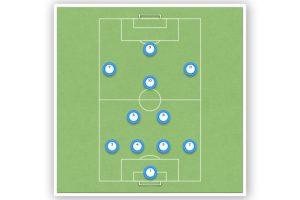The Deep-Lying Playmaker: The Essential Metronome of a Successful Soccer Team
As a soccer enthusiast, I have always been fascinated by the role of the deep-lying playmaker in a team. This position requires a player to be the metronome of the team, controlling the pace of the game and dictating the flow of play. The deep-lying playmaker is a vital cog in the midfield, and their ability to read the game and distribute the ball effectively can make all the difference in a match.
Playing as a deep-lying playmaker is not an easy task. It requires a player to have unique skills, including excellent vision, passing accuracy, and the ability to read the game. The deep-lying playmaker must be able to receive the ball from the defenders and quickly distribute it to the attacking players, all while maintaining possession and controlling the tempo of the game.
Despite the challenges, the deep-lying playmaker is essential to any team. They are often the unsung heroes of the midfield, quietly going about their business and making a significant impact on the game. In this article, we will explore why the deep-lying playmaker is the metronome of the soccer team and how they can make a difference in a match.
The Role of the Deep-Lying Playmaker
As a soccer player, I have always been fascinated by the deep-lying playmaker role. This is a position that requires a unique set of skills, both defensive and offensive, and is crucial to the success of any team. In this section, I will discuss the role of the deep-lying playmaker, including their defensive duties and creative responsibilities.
Defensive Duties
While the deep-lying playmaker is primarily known for their attacking abilities, they also play an important role in the team’s defense. As the name suggests, this player typically operates in a deeper position on the field, just in front of the backline. This allows them to intercept passes and break up opposition attacks before they can reach the defense.
In addition to their positioning, the deep-lying playmaker must also be skilled at tackling and pressing. They must be able to win the ball back and immediately transition it into an attack. This requires a high level of fitness, as the player must be able to cover a lot of ground and maintain their intensity throughout the game.
Creative Responsibilities
While the deep-lying playmaker’s defensive duties are important, their real value lies in their ability to create chances for their team. This player is often referred to as the “metronome” of the team, as they control the tempo of the game and dictate the pace of play.
The deep-lying playmaker must be comfortable on the ball and have excellent passing skills. They must be able to read the game and anticipate the movement of their teammates, as well as the opposition. This allows them to distribute the ball effectively and create space for their teammates to exploit.
In addition to passing, the deep-lying playmaker must also be able to shoot from distance. This can be a valuable weapon, as it forces the opposition to close down the player and creates more space for their teammates.
Overall, the deep-lying playmaker is a vital player in any soccer team. They must be able to balance their defensive duties with their creative responsibilities, and have the ability to control the game from deep positions on the field.
The Importance of the Metronome
Controlling the Pace of the Game
As a deep-lying playmaker, I understand the importance of controlling the pace of the game. This is where the metronome analogy comes in. Just like a metronome sets the tempo for a piece of music, the deep-lying playmaker sets the tempo for the team. By controlling the game’s pace, we can dictate the rhythm of play and keep the opposition on their toes. This allows us to create openings and opportunities for our team to score.
Dictating the Team’s Style of Play
The deep-lying playmaker is responsible for dictating the team’s style of play. This means that we have to be able to read the game and make quick decisions about how we want to approach each situation. By doing this, we can help to create a cohesive and effective style of play that allows us to dominate possession and control the game.
Providing Stability to the Team
One of the most important roles of the deep-lying playmaker is to provide stability to the team. This means that we have to be able to maintain possession of the ball and keep the team moving forward. By doing this, we can help to create a sense of calm and confidence on the field, which is essential for success. In conclusion, the deep-lying playmaker is the metronome of the soccer team. We are responsible for controlling the pace of the game, dictating the team’s style of play, and providing stability to the team. By doing this, we can help to create a cohesive and effective team that is capable of dominating possession and controlling the game.
Deep Lying Playmaker vs Regista
Famous Deep-Lying Playmakers
Andrea Pirlo
When talking about the deep-lying playmaker, Andrea Pirlo is the first name that comes to mind. Pirlo is considered by many as the best deep-lying playmaker of all time. He was a master of controlling the tempo of the game and dictating the play from deep. Pirlo had a unique ability to read the game and find space in tight areas. His vision and passing accuracy were exceptional, making him a nightmare for opposition defenders.
Pirlo played for several top clubs, including AC Milan, Juventus, and New York City FC. He won numerous domestic and international titles, including the World Cup with Italy in 2006. Pirlo’s contribution to the game as a deep-lying playmaker will always be remembered.
Xavi Hernandez
Xavi Hernandez is another legendary deep-lying playmaker. He spent most of his career at Barcelona, where he won multiple domestic and international titles. Xavi was the heartbeat of the Barcelona team that dominated world football under Pep Guardiola. His ability to control the tempo of the game and keep possession was crucial to Barcelona’s success.
Xavi was a master of the short-passing game, with an incredible passing accuracy of over 90%. He was also an excellent reader of the game and had a great understanding of space and movement. Xavi’s contribution to the game as a deep-lying playmaker is undeniable.
Sergio Busquets
Sergio Busquets is one of the best deep-lying playmakers in the modern game. He has spent his entire career at Barcelona, where he has won numerous domestic and international titles. Busquets is known for his incredible ability to read the game and break up opposition attacks.
Busquets is also an excellent passer of the ball, with a passing accuracy of over 90%. He has a great understanding of space and movement and is always looking to find his teammates in dangerous positions. Busquets’ contribution to the game as a deep-lying playmaker is significant, and he will undoubtedly go down as one of the best in history.
Conclusion
After analyzing the deep-lying playmaker role in soccer, it is clear that this position is crucial for the success of any team. As a deep-lying playmaker, I understand the importance of controlling the tempo of the game and providing a link between defense and attack.
Through my passing abilities and playmaking skills, I am able to dictate the pace of the game and create scoring opportunities for my team. This role requires a high level of technical ability and vision, as well as a strong understanding of the game.
While the deep-lying playmaker may not always receive the same recognition as other positions on the field, their impact on the game cannot be understated. They are the metronome of the team, setting the rhythm and pace of play.
As a deep-lying playmaker, my goal is to continue to improve my skills and contribute to the success of my team. I am proud to play this crucial role and will continue to work hard to perfect my craft.






